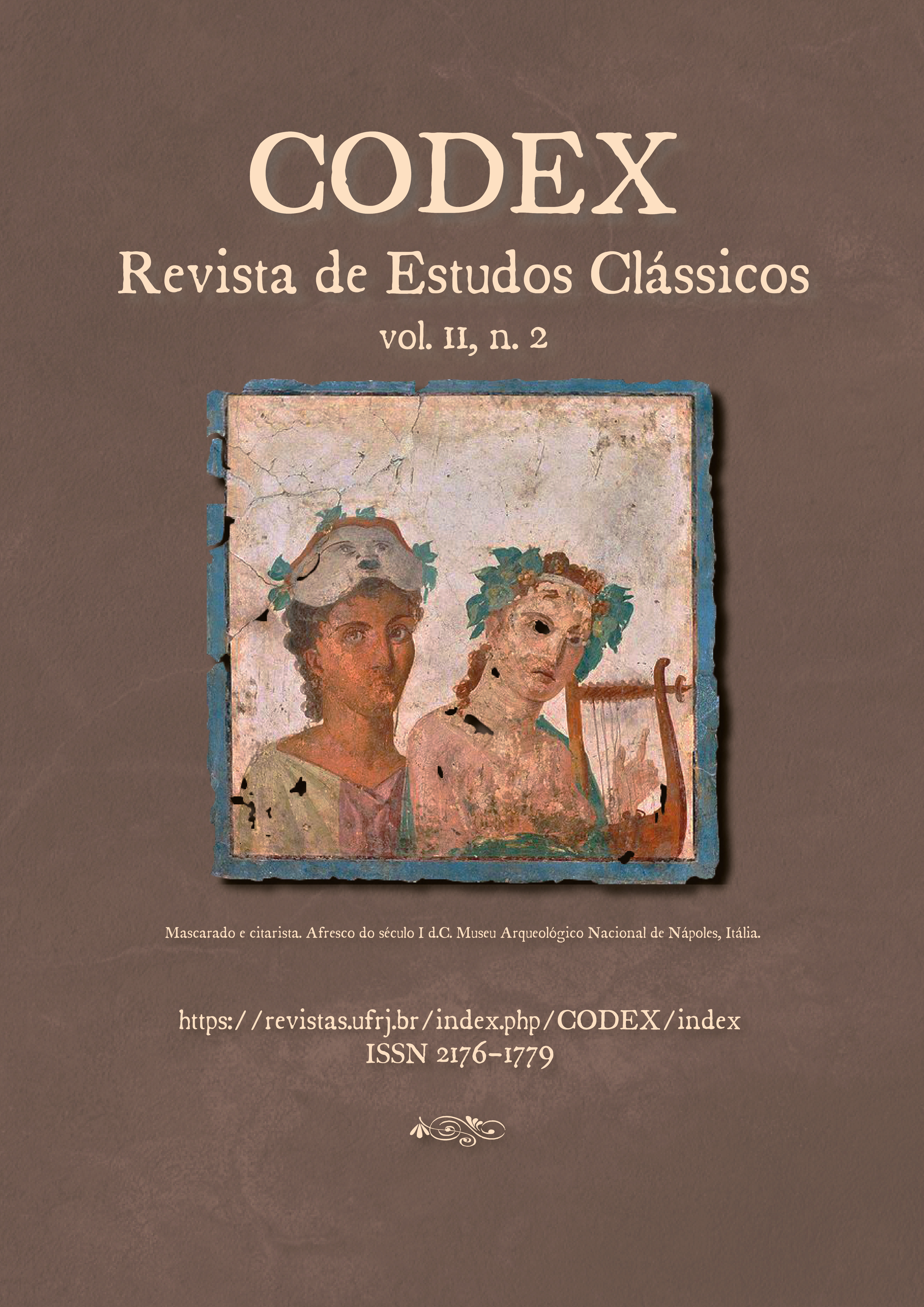Ambivalências do lógos
uma leitura da Antígona de Sófocles
DOI:
https://doi.org/10.25187/codex.v11i2.59153Palavras-chave:
Tragédia antiga, Sófocles, Antígona, Creonte, Estudos de gêneroResumo
A tragédia Antígona de Sófocles costuma ser lida na Modernidade a partir de uma contraposição entre valores e perspectivas defendidos pela personagem homônima e aqueles privilegiados por seu tio e governante de Tebas, Creonte: oîkos [lar] / pólis [cidade]; feminino / masculino; religião / política; leis não-escritas / leis escritas; etc. Algumas leituras contemporâneas, inclusive, chegam a propor uma compreensão positiva das atitudes de Antígona, por oposição àquelas assumidas por Creonte (caracterizadas como negativas). No presente artigo, avanço uma interpretação que se baseia numa leitura filológica da peça — informada ainda por estudos antropológicos atentos a questões de gênero e a certas práticas socioculturais — a fim de problematizar esse tipo de tratamento dicotômico simplificado. Pretendo indicar que existe muito de Antígona em Creonte e vice-versa, argumentando em prol de uma compreensão mais atenta às nuances de caracterização dessas personagens, assim como da reflexão trágica de Sófocles: o que se encontra em jogo aqui não é uma solução simples para os dilemas da existência, mas uma problematização da condição humana, dividida entre família e cidade, entre feminino e masculino, entre compromissos religiosos e políticos, esforçando-se por existir.
Downloads
Referências
CARTER, David. Antigone. In: MARKANTONATOS, Andreas (ed.). Brill’s Companion to Sophocles. Leiden; Boston: Brill, 2012, p. 111-28.
FOLEY, Helene. Tragedy and Democratic Ideology: The Case of Sophocles’ Antigone. In: GOFF, Barbara (ed.). History, Tragedy, Theory: Dialogues on Athenian Drama. Austin: University of Texas Press, p. 131-50.
GOLDHILL, Simon. The Great Dionysia and Civic Ideology. The Journal of Hellenic Studies, v. 107 (1987), p. 58-76.
GOLDHILL, Simon. Reading Greek Tragedy. Cambridge: Cambridge University Press, 1986.
HESTER, D. A. Sophocles the Unphilosophical: A Study in the Antigone. Mnemosyne, Vol. 24, Fasc. 1, 1971, p. 11-59.
JAEGER, Werner. Paideia: A Formação do Homem Grego. Trad. Artur M. Parreira. São Paulo: WMF Martins Fontes, 2013.
KNOX, Bernard M. W. Édipo em Tebas: O herói trágico de Sófocles e seu tempo. Trad. Margarida Goldsztyn. São Paulo: Editora Perspectiva, 2002.
KNOX, Bernard M. W. The Heroic Temper: Studies in Sophoclean Tragedy. Berkeley; Los Angeles; London: University of California Press, 1983.
LARDINOIS, André. Antigone. In: ORMAND, Kirk (ed.). A Companion to Sophocles. Malden; Oxford; Chichester: Wiley-Blackwell, 2012, p. 55-68.
LESKY, Albin. A tragédia grega. Trad. J. Guinsburg, Geraldo Gerson de Souza e Alberto Guzik São Paulo: Editora Perspectiva, 2010 [1938].
LEWIS, R. G. An Alternative Date for Sophocles’ Antigone. Greek, Roman and Byzantine Studies, vol. 29, n. 1 (1988), p. 35-50.
LORAUX, Nicole. L’Invention d’Athènes : Histoire de l’oraison funèbre dans la « cité classique ». Paris : Édition de l’EHESS, 1981.
LORAUX, Nicole. La voix endeuillée: Essai sur la tragédie grecque. Paris : Gallimard, 1999.
McCOSKEY, Denise Eileen; CORBETT, Mary Jean. Virginia Woolf, Richard Jebb, and Sophocles’ Antigone. In: ORMAND, Kirk (ed.). A Companion to Sophocles. Malden; Oxford; Chichester: Wiley-Blackwell, 2012, p. 462-76.
McHARDY, Fiona. Women’s influence on revenge in ancient Greece. In: McHARDY, Fiona; MARSHALL, Eireann (eds.). Women’s Influence on Classical Civilization. London; New York: Routledge, 2004, p. 92-114.
NUSSBAUM, Martha. The Fragility of Goodness: Luck and Ethics in Greek Tragedy and Philosophy. Revised Ed. Cambridge: Cambridge University Press, 2001.
RABINOWITZ, Nancy Sorkin. Politics of inclusion/exclusion in Attic tragedy. In: McHARDY, Fiona; MARSHALL, Eireann (eds.). Women’s Influence on Classical Civilization. London; New York: Routledge, 2004, p. 40-55.
RINGER, Mark. Electra and the Empty Urn: Metatheater and Role Playing in Sophocles. Chapel Hill; London: The University of North Carolina Press, 1998.
SEAFORD, Richard. Reciprocity and Ritual: Homer and Tragedy in the Developing City-State. Oxford: Clarendon Press, 1994.
SILVA, Maria de Fátima. Antigone. In: LAURIOLA, Rosanna; DEMETRIOU, Kyriakos N. (eds.). Brill’s Companion to the Reception of Sophocles. Leiden; Boston: Brill, 2017, p. 391-474.
SOURVINOU-INWOOD, Christiane. Assumptions and the creation of meaning: Reading Sophocles’ Antigone. Journal of Hellenic Studies, vol. 99, 1989, p. 134-48.
VERNANT, Jean-Pierre. Tensões e ambiguidades na tragédia grega. In: VERNANT, Jean-Pierre; VIDAL-NAQUET, Pierre. Mito e tragédia na Grécia antiga. 2 ed. São Paulo: Perspectiva, 2011, p. 7-24.
VIDAL-NAQUET, Pierre. Édipo em Atenas. In: VERNANT, Jean-Pierre; VIDAL-NAQUET, Pierre. Mito e tragédia na Grécia antiga. 2 ed. São Paulo: Perspectiva, 2011, p. 267-86.
WISE, Jennifer. Dionysus writes. Ithaca and London: Cornell University Press, 1998.
ZEITLIN, Froma I. Playing the Other: Theater, Theatricality, and the Feminine in Greek Drama. In: WINKLER, John J.; ZEITLIN, Froma I. (eds.). Nothing to Do with Dionysos? Athenian Drama in Its Social Context. Princeton: Princeton University Press, 1990a, p. 63-96.
ZEITLIN, Froma I. Thebes: Theater of Self and Society in Athenian Drama. In: WINKLER, John J.; ZEITLIN, Froma I. (eds.). Nothing to Do with Dionysos? Athenian Drama in Its Social Context. Princeton: Princeton University Press, 1990b, p. 131-67.
Downloads
Publicado
Como Citar
Edição
Seção
Licença
Copyright (c) 2024 Rafael Guimarães Tavares da Silva

Este trabalho está licenciado sob uma licença Creative Commons Attribution-NonCommercial 4.0 International License.
A Codex - Revista de Estudos Clássicos utiliza uma licença Creative Commons - Atribuição-NãoComercial 4.0 Internacional.
Os autores dos trabalhos aprovados autorizam a revista a, após a publicação, ceder seu conteúdo para reprodução em indexadores de conteúdo, bibliotecas virtuais e similares.
A revista se permite o uso dos trabalhos publicados para fins não comerciais, incluindo o direito de enviar o trabalho para bases de dados de acesso público.










